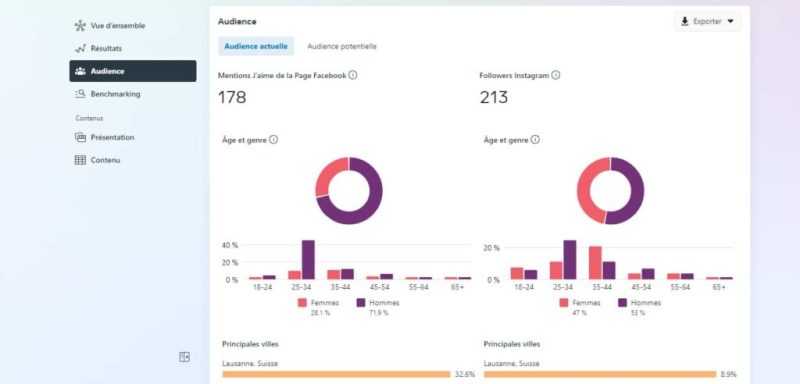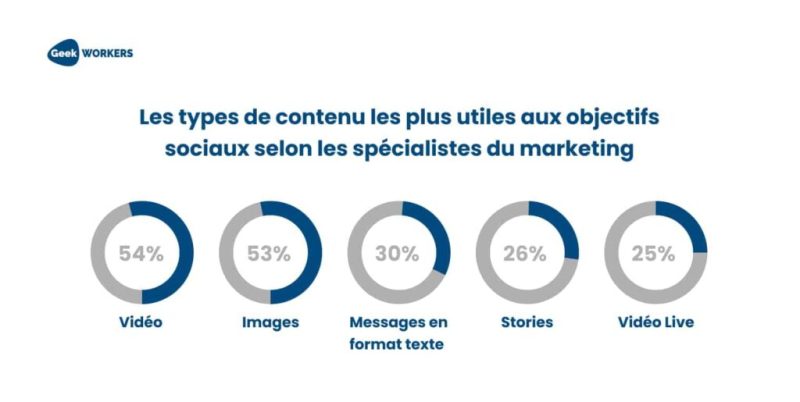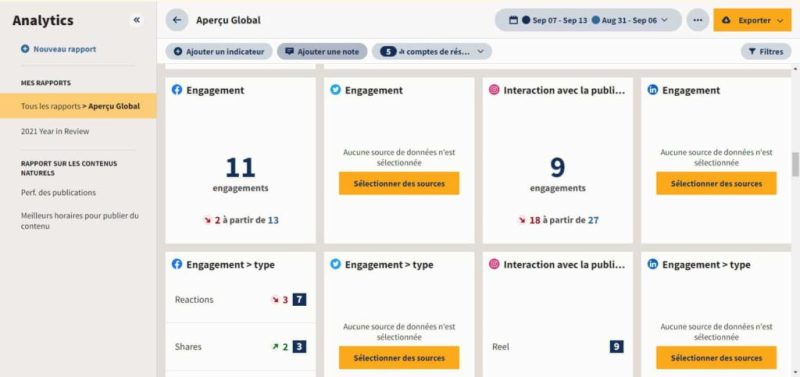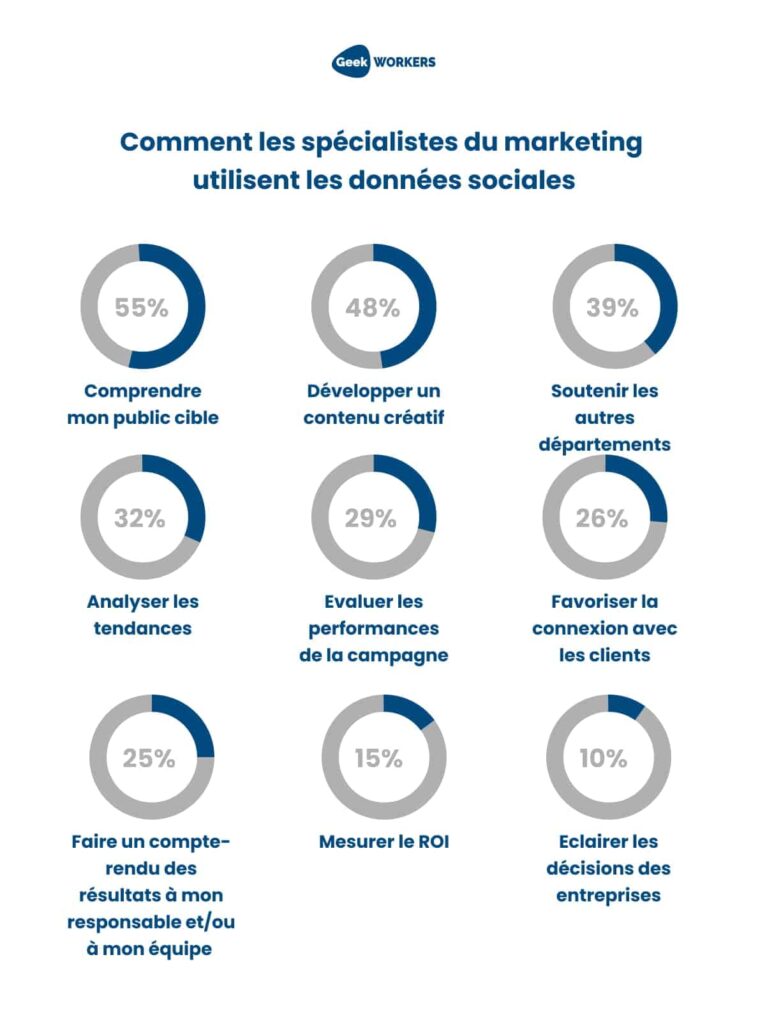Looking to refine your social media marketing strategy?
Great ! Now is the perfect time to do it.
In a landscape where competition, content and networks are more numerous than ever, a effective strategy gives you the focus to say "no" to efforts that don't serve your goals.
That's why we've put together a comprehensive guide to creating a social media marketing plan from scratch.
Let's start by answering the big question:
“What is social media marketing, anyway? »
Put simply, social media marketing is all about leveraging social media platforms to promote your brand and sell your product or service. Just as you prepare the other aspects of your Marketing strategy, you need to have a plan for your social media marketing. Luckily, this guide tells you how to create that blueprint.
Social media strategy planning starts with your goals.
The most common social networking goals are to increase brand awareness (58 %) and increase community engagement (41 %). Whether you want to build a larger audience or a more active community, taking the time to define your social goals is the first step to achieving them.
Either way, your goals will define your social media marketing strategy and the time and energy you need to devote to your campaigns.
What really matters is that you set realistic social media goals.
The emphasis is on the word 'realistic', by the way. We recommend tackling smaller goals that will allow you to scale up your social media efforts in a way that's both reasonable and affordable.
Below are some examples of goals that businesses of all shapes and sizes can pursue.
Increase brand awareness: that means you have to make your name known. To create authentic and lasting notoriety, avoid publishing only promotional messages. Instead, focus on content that puts your personality and values first.
Generate leads and sales: whether online, in-store or directly on your social profiles, followers do not make purchases by chance. For example, do you routinely notify customers of new products and promotions? Do you integrate your product catalog with your social profiles? Do you offer exclusive offers to your subscribers?
Grow your brand's audience: Attracting new subscribers means finding ways to get your brand in front of people who haven't heard of it yet.
Growing your audience also means uncovering the conversations around your business and industry that matter most. It's nearly impossible to dig into your social channels without monitoring or listening for specific keywords, phrases, or hashtags. Taking the pulse of these conversations allows you to expand your core audience (and reach adjacent audiences) much faster.
Boost community engagement: Index data shows that 46 % of consumers think brands that engage their audience are best-in-class on social media. It is therefore useful to explore new ways to attract the attention of your current subscribers. This means experimenting with messages and content. For example, does your brand encourage user-generated content and hashtags ?
Even something as simple as asking a question can increase your engagement rate. Your customers can be your best cheerleaders, but only if you give them something to do.
Drive traffic to your site: it's quite simple. If your goal is to drive leads or traffic to your website, social media can help with that. Whether through promotional messages or social ads, keeping tabs on conversions and URL clicks can help you better determine social media ROI.
Any combination of these goals is good to take and can help you better understand the networks you need to tackle. When in doubt, keep your social media marketing strategy simple rather than complicating it with too many goals that could distract you. Choose one or two and rally your team around them.
Making assumptions is bad news for marketers.
Only 55% of marketers use social data to better understand their target audience, which represents a huge opportunity for leaders and practitioners. Much of what you need to know about your audience to influence your social media marketing strategy is already available. You just need to know where to look.
With the right tool, marketers can quickly research their audience. No need for formal market research or data science skills.
Here are some key things to remember for your social media marketing strategy:
Don't spread yourself too thin. Instead, focus on networks where your core audience is already active.
While the above demographics give you insight into each channel, what about your own customers? Further analysis is needed before you can determine what your social customers actually look like in the real world.
That's why many brands use a social media dashboard that provides insight into who follows you and how they interact with you on each channel.

There are many other sources of valuable audience data to supplement your social media insights. These include your Google and email analytics, your CRM, your customer service platform, or even your best-selling products.
All of the above will ultimately influence everything from your marketing message to how you approach customer service or social commerce.
Whatever your goals or industry, your social media strategy should be data-driven.
This means focusing on the social media metrics that matter. Rather than focusing on vanity metrics, dig into the data that directly aligns with your goals.
What indicators are we talking about? Check out the breakdown below:
An effective social media marketing strategy relies on numbers. That said, these numbers need to be put into a context that matches your original goals.
No surprise here. Your social media marketing strategy relies on your content.
At this point, you should have a pretty good idea of what to post based on your goals, audience, and brand identity. You probably also know which networks to cover.
But what about your content strategy? Below are some ideas and inspirations that can help you.
To help you clarify what you need to post and ensure that you develop innovative content, here are some trends to consider on social media.
Stories aren't going away anytime soon. Leveraging FOMO or fear of missing out (the fear of missing something) from your followers, Stories-type content is both interactive and unmissable. By default appearing first in your followers' feed, this content can help your brand's account "jump the line" and stay top of mind with your audience.
https://geekworkers.ch/wp-content/uploads/2022/09/Video-Story-Geekworkers.mp4Stories are particularly useful for taking your followers behind the scenes and making your social feed more personal. For example, think about how you can use Stories to cover an event or take your followers on a trip without them having to leave the comfort of the gram.
54% of marketers say video is the most valuable type of content for achieving social goals, and for good reason. Social video is booming, especially with the rise of TikTok and coils Instagram. Long-form and short-form productions continue to dominate the social space across all platforms due to their high engagement rate.

Plus, with advances in DIY and remote video production, you don't need a huge video production budget to be successful. All you need is a laptop or smartphone and a few tricks of the trade.
Personal and customizable content should be the cornerstone of your social media marketing strategy. Don't be afraid to remind your followers of the people behind your posts.
Before you start creating content, you need to have a good idea of what your competitors are doing.
While some brands might want to turn to sophisticated analytics tools to dig deeper into the competition numbers, you can learn a lot from just looking at competitors' social presence.
The easiest way to find competitors is to do a Google search. Research the most valuable keywords, phrases, and industry terms to see who pops up.
Then see how their social channels compare to your own promotion strategy. The goal here is not to copy or steal your competitors' ideas. No two companies' social media marketing strategies can (or should) be the same. Instead, figure out what works for them and what conclusions you can draw to adapt your own campaigns accordingly.
After identifying some of your industry competitors, you can use competitive analysis tools to quickly compare the competitors' performance to your own.
Look at what they post on Facebook. Compare your engagement on Twitter with theirs. Find out how they tag their content on Instagram. Optimize your own strategy. Rinse and repeat.
News is arguably more important than ever to marketers.
You are not only expected to regularly release fresh content, but also to always be available for your customers.
But you can't always expect customers to work at your pace. Meeting deadlines is a big challenge when you're short on resources or part of a small team.
Let's look at some ideas for optimizing your schedule and the time you spend on social media.
Quick question: When is your brand available to engage and interact with customers?
You might see some recommended times to post late at night, for example. But if your team isn't there to communicate, what's the point of posting at the "preferred" time?
Instead, try to make sure your social media or community managers are available and ready to answer any product questions or concerns when you tweet or post. Take the time to review the best times to post on social media. However, it is equally important to engage after publication.
And that brings us to the next point.
Your customers want quick answers. In fact, 47 % of them believe that great customer service defines a top brand on social media.
Your brand can't forget these fundamentals of building a community. It takes effort to ensure conversations or engagement opportunities don't go unanswered.
On social media, you earn respect for a brand by being present and talking to your audience. That's why social customer service is so important for brands looking to build awareness with their audience – words travel fast about great service.
Whether it's capitalizing on a compliment or answering a question, businesses shouldn't leave customers hanging. According to our studies, social networks are the first preferred channel for consumers to share their feedback and report a service problem or question. But did you know that most users think brands should respond to social media posts within four hours?
By assigning teams specific response tasks, you can help your staff function like a well-oiled social media team, whether you're a group of one person or 100 people.
With the evolution of social media algorithms, organic content is finding it increasingly difficult to reach the majority of your audience. The last thing you want to do is ignore those who engage and lose the opportunity to send more to your marketing funnel.
You should now have an overview of your social media strategy.
However, it is important that you can adapt your strategy throughout the year.
Without ongoing analysis of your efforts, you would never know how one campaign performed versus another. Having an overview of your social media activity helps put things into perspective. This means looking at your best performing content and adjusting your campaigns when your content stagnates.
It is undeniable that the refinement of a social media strategy is done through trial and error. Tracking your campaign metrics in real time allows you to make small changes to your social media marketing strategy rather than time-consuming drastic changes.
A big part of social media marketing starts with good data management. You can be reactive in the short term to get the most out of your ongoing campaigns, then proactively use these elements to inform your next strategy review.

Data reporting is also important in order to share valuable social insights with your colleagues and collaborators.
Based on your data, you can better assess whether your KPIs are really measuring up to your overall business goals or whether they need to be changed.
Social media teams have a unique advantage when it comes to understanding customer sentiment. You are the eyes and ears of your brand online. This information can do more than inform marketing strategy. They can transform your business.
Yet, according to data from Index, only 39% of marketers are using social data to support other departments.

Social media teams that stand out will approach cross-departmental collaboration with enthusiasm and intention.
The short answer? All. But don't bite off more than you can chew. Instead, start where you think you can have the most impact. Here are some ideas to launch your strategy.
We are in the midst of an incredibly competitive job market. Collaborating with HR on social employer branding initiatives can do more than quickly fill vacancies. It can also attract stronger and more qualified candidates.
A survey of 250 business leaders found that in the future, 90 % of them expect social media to be the primary channel for communicating with customers. Sharing social insights with your sales organization can enable reps to work smarter in the context of increasingly digital customer journeys.
You've probably received quite a few feature or product requests while managing your brand's social inbox. With a social media management tool, you can distill these messages into actionable insights for your product or service teams. merchandising. This information can complement existing roadmap research, creating a customer-focused plan that will delight you.
This guide emphasizes that a modern social presence has many moving parts.
That said, setting up yours doesn't have to be a chore.
If you set yourself achievable goals and address each of the steps above, you'll already have a head start on your social media marketing strategy.
And if you need a boost for your social media marketing strategy, Geekworkers offers to accompany you in the development of a very precise and effective strategy to serve your e-reputation
Our web agency is focused on quality and satisfaction for both
entrepreneurs, SMEs and large companies in French-speaking Switzerland
Our Web & Marketing agency is present at Lausanne since 2020 and now has more than 25 employees to support SMEs, entrepreneurs and large companies in French-speaking Switzerland.
More infos

Marketing Manager

Technical Manager
Your local digital partner. Creation of high-impact WordPress sitesstrategies effective marketing and support reagent.
Create a exceptional shopping experience. We develop WooCommerce shops optimized conversion and SEO.
Generate more leads and sales. Strategies SEO, SEA (Google Partner) and Social Ads tailor-made for maximum impact.
Geekworkers is a web agency based in Lausanne in French-speaking Switzerland, specialising in the creation of websites, e-commerce shops, mobile applications and digital marketing (SEO & Google Ads) to help you succeed online.
Geekworkers pricing has been designed as much for start-ups and SMEs as for large companies demanding in terms of service quality.
To provide the best experiences, we use technologies such as cookies to store and/or access device information. Consenting to these technologies will allow us to process data such as browsing behavior or unique identifiers on this site. Not consenting or withdrawing consent may adversely affect certain functionality and features.